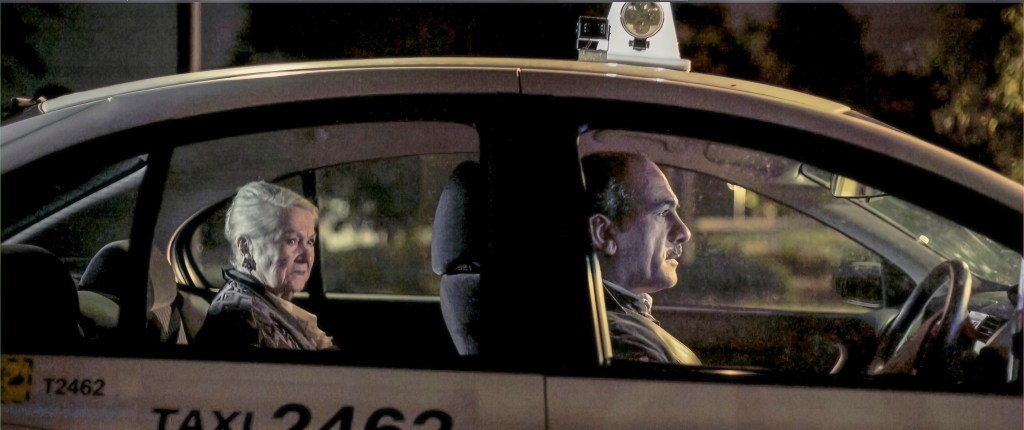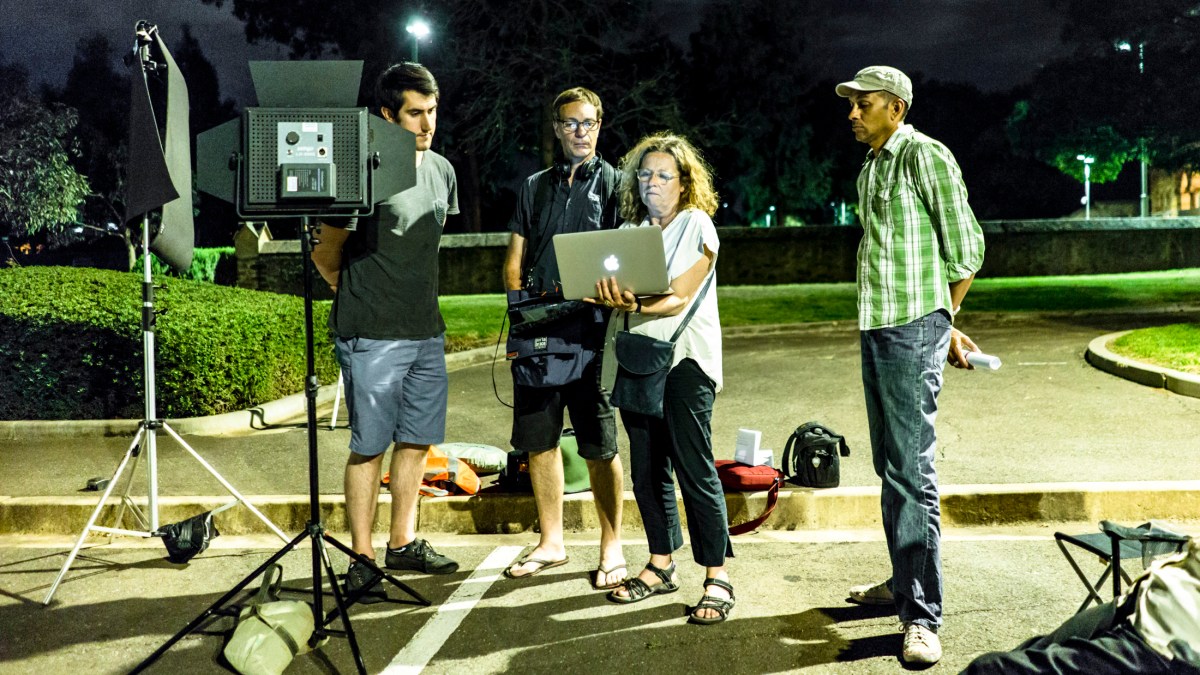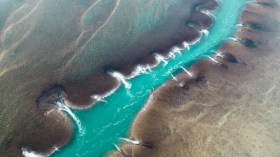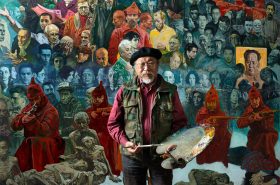As a theatre maker, Madeleine Blackwell is no stranger to the powerful chemistry that comes from putting two very different actors together and watching tensions rise as their characters reach an emotional tipping point.
‘I’m very much a theatre animal,’ she says, when we speak.
It was only after treading the boards for some time that Blackwell felt the impulse to give filmmaking a go.
‘I have made some small films on the side, and written some features that never got made,’ she says, ‘but this is the one I couldn’t afford to put back in the drawer.’
That film she couldn’t put back is her debut feature, Damage. The film arrives in cinemas today, and brings with it a story of two very different people: Ali, an asylum seeker who drives a taxi to keep things afloat, and Esther, an elderly woman who can’t remember where she wants to go. Determined to help her despite her rude remarks, Ali drives Esther around the city until she begins to recall details of her life. Surveillance cameras silently observe their journey as the two find an unlikely connection.
Read: Deadloch nominated for 2023 Casting Guild of Australia Awards
Damage is a poignant story about prejudice, human nature, and the omnipresence of unjust laws, told through a balance of intimate, close-up sequences, and distant, birds-eye view scenes. ‘When you get in a taxi with somebody, you don’t know their CV, where they’re from, or anything,’ says Blackwell. ‘But sometimes you really connect, and end up talking about really profound things in that 20-minute drive. That’s what happens in this film’.
It’s something of miracle that it got made at all – ‘I wrote the script and approached many, many producers, but no one was interested. So I started producing and raising the funds myself’. Eventually, Sharon Cleary and Peter Thurmer came on board as co-producers as Blackwell obtained $100,000 in funding via the Australian Cultural Fund. The entire process took about five years, including pandemic interruptions.
Amplifying asylum seeker voices
Blackwell says she felt compelled to make a story about asylum seekers’ treatment in Australia after ‘becoming overwhelmed by stories’ told by advocates like Ali Al Jenabi. Al Jenabi is a non-actor who plays Ali in the film – and does a tremendous job, I might add.
‘It [Damage] was born of a feeling of utter frustration about what was happening in Australia,’ she says. ‘Particularly regarding the treatment of asylum seekers, and the cruel and torturous policies we have as a preventative measure to stop other people from coming.’
It’s also worth noting that Al Jenabi is himself an Iraqi asylum seeker, who has been living in Sydney on a pending removal visa for over twenty years. His life story is the subject of a book, The People Smuggler -The True Story of Ali Al Jenabi, the ‘Oskar Schindler of Asia’, which won the Human Rights Book Award in 2012. Though he has never acted before, he fell into the role of Ali quite comfortably, learning to connect with his non-actor co-star Imelda Bourke (who happens to be Blackwell’s mother) and improvising with his lines.
‘He’s quite extraordinary. He’s definitely got a lot of talent,’ Blackwell says.
Read: The Australian Wars – landmark series sells to the BBC
Blackwell had been attending talks with asylum seekers for years, learning their stories and becoming more and more desperate to create something that would speak to their experiences. It was enlightening for her, while simultaneously being overwhelming. ‘Suddenly, I had a dream that somehow distilled the enormity of all of those stories – and it was just two people inside a car.’
‘I became inspired by the films of Abbas Kiarostami, particularly Taste of Cherry. I love the way he positioned himself as a storyteller in the midst of all these social movements, politics, and human relationships.’
Acting naturally

The script for Damage, written by Blackwell, became a launching pad of sorts for the actors, who used the basic structure to improvise some of their scenes. She encouraged Al Jenabi and Bourke to use their own lives as resources for the realism-inspired narrative.
Al Jenabi had plenty to draw from when it came to the refugee experience, and was confident in inventing dialogue for the character: ‘He would often reinterpret lines in the script, and just translate them into his own vernacular, which was really beautiful. He’s got a very poetic way of speaking – and sometimes he would even sing!’
Imelda Bourke, a former jazz singer from Adelaide who was, at the time of shooting, 89 years old, drew from her experiences as a product of ‘the silent generation’.
‘She was used to performing, but she had never played a big role in front of a camera before,’ Blackwell says. ‘She was fantastic.’
Bourke has now sadly passed away, but Blackwell happily recounts the experience of making Damage with her late mother, and reveals that she had indeed seen the final cut on the big screen before passing. ‘She had such a connection with Ali, and that’s been lovely to watch over and over again on the big screen.’
Despite her incredible luck with the two leads, Blackwell was still plagued by doubts about whether Damage would become the film she hoped it would be. The editing process was long, and didn’t really follow a script, instead opting for a looser approach due to the improvisational nature of the scenes.
‘My editor Raphael Rivera sent me this scene one day – it’s a pretty important one, where the two characters go into the carwash,’ she says. ‘The whole filmmaking process had been so difficult, and I was feeling so insecure about whether or not to keep going, but when I saw that scene, I I knew we had a film.’
‘It was a real blessing.’
Damage is in select Australian cinemas from today.





